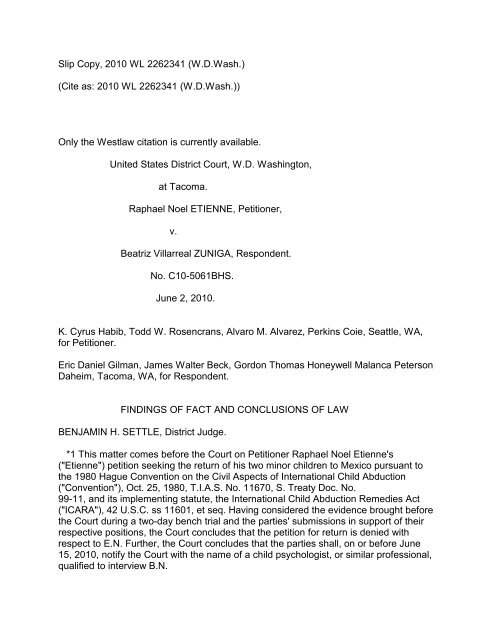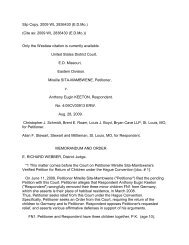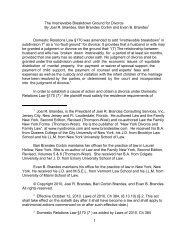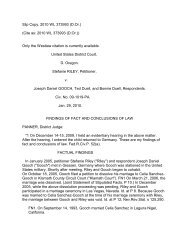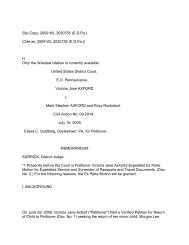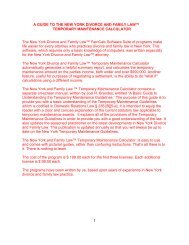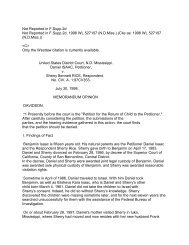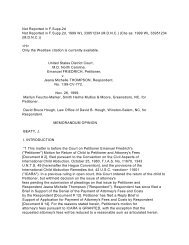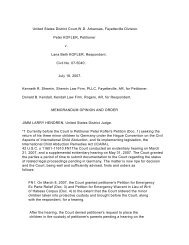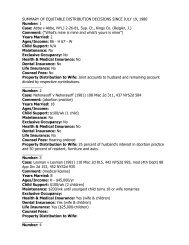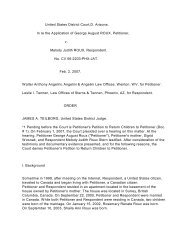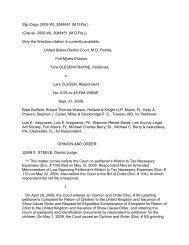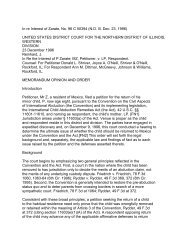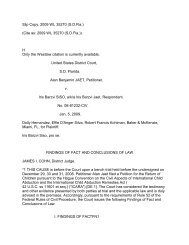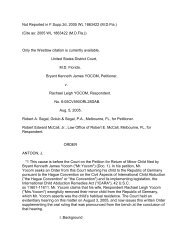Etienne v. Zuniga
Etienne v. Zuniga
Etienne v. Zuniga
You also want an ePaper? Increase the reach of your titles
YUMPU automatically turns print PDFs into web optimized ePapers that Google loves.
Slip Copy, 2010 WL 2262341 (W.D.Wash.)<br />
(Cite as: 2010 WL 2262341 (W.D.Wash.))<br />
Only the Westlaw citation is currently available.<br />
United States District Court, W.D. Washington,<br />
at Tacoma.<br />
Raphael Noel ETIENNE, Petitioner,<br />
v.<br />
Beatriz Villarreal ZUNIGA, Respondent.<br />
No. C10-5061BHS.<br />
June 2, 2010.<br />
K. Cyrus Habib, Todd W. Rosencrans, Alvaro M. Alvarez, Perkins Coie, Seattle, WA,<br />
for Petitioner.<br />
Eric Daniel Gilman, James Walter Beck, Gordon Thomas Honeywell Malanca Peterson<br />
Daheim, Tacoma, WA, for Respondent.<br />
FINDINGS OF FACT AND CONCLUSIONS OF LAW<br />
BENJAMIN H. SETTLE, District Judge.<br />
*1 This matter comes before the Court on Petitioner Raphael Noel <strong>Etienne</strong>'s<br />
("<strong>Etienne</strong>") petition seeking the return of his two minor children to Mexico pursuant to<br />
the 1980 Hague Convention on the Civil Aspects of International Child Abduction<br />
("Convention"), Oct. 25, 1980, T.I.A.S. No. 11670, S. Treaty Doc. No.<br />
99-11, and its implementing statute, the International Child Abduction Remedies Act<br />
("ICARA"), 42 U.S.C. ss 11601, et seq. Having considered the evidence brought before<br />
the Court during a two-day bench trial and the parties' submissions in support of their<br />
respective positions, the Court concludes that the petition for return is denied with<br />
respect to E.N. Further, the Court concludes that the parties shall, on or before June<br />
15, 2010, notify the Court with the name of a child psychologist, or similar professional,<br />
qualified to interview B.N.
consistent with the Court's instructions below. In support of these conclusions, the<br />
Court makes the following findings of fact and conclusions of law:<br />
A. Background<br />
I. FINDINGS OF FACT AND DISCUSSION<br />
<strong>Etienne</strong> and Respondent Beatriz Villarreal <strong>Zuniga</strong> ("Villarreal") were married on July<br />
29, 1994. Exh. 3. They have one daughter, "E.N.," who was born-/-/ 1995 (Exh.<br />
4), and one son, "B.N.," who was born-/-/2002 (Exh. 5). <strong>Etienne</strong>, Villarreal, and the<br />
children are all citizens of Mexico.<br />
Both of the children were born in Mexico and lived there until July of 2008.<br />
See Exhs. 4 & 5; Tr. 192-93. Beginning with kindergarten, E.N. and B.N. were enrolled<br />
at a private school in Mexico City. Tr. 42; 124. Both children did well in school. Exhs. 18<br />
& 19. Both children had lots of friends, were involved in many extra-curricular activities,<br />
and lived in very close proximity to more than twelve members of Villarreal's extended<br />
family. Tr. 65-67; 69-70; 185-86.<br />
<strong>Etienne</strong> and Villarreal were both involved in raising their children while they lived in<br />
Mexico. Tr. 34; 191. Both parents were responsible for cooking meals for the children,<br />
shopping for groceries and other household items, driving the children to school, and<br />
generally spending time with the children. Tr. 34; 59; 60; 191. Both parents were also<br />
financially responsible for the children. Tr. 37; 254-55. There was conflicting testimony<br />
and evidence regarding the status of tuition that was supposedly paid to the children's<br />
school for the 2007-2008 school year. Tr. 42-43; 160-61; 225-26; Exhs. A-7 & A-8.<br />
Regardless of when or even whether that tuition was paid, the Court finds that both<br />
parents contributed to the financial needs of the children. See Tr. 37-38; 254-55; Exhs.<br />
25, 56, 57.<br />
<strong>Etienne</strong>, Villarreal and the children took vacations together as a family while they<br />
were<br />
living in Mexico. Tr. 48-49; 256. Villarreal and the children also took several vacations<br />
by themselves to see her family in Washington prior to 2008. Tr.<br />
192-93.<br />
Although <strong>Etienne</strong> testified that he and Villarreal had never separated while in Mexico<br />
and that the family remained living together until on or about July 4, 2008 (Tr. 116-17),<br />
the Court does not find this testimony credible. First, this testimony conflicted with<br />
<strong>Etienne</strong>'s earlier statements that his children's school forms needed both his and<br />
Villarreal's signatures because "according to the rules of the school ... if the parents are<br />
divorced or separated, they have to know so they can't accept only one signature." Tr.<br />
51; 167-69. Further, according to Villarreal, she and <strong>Etienne</strong> began living separately for<br />
the final time in early June of 2007 and remained in separate residences until she and<br />
the children left for the United States on July 4, 2008. Tr. 252; 284-85; 300. E.N. also<br />
testified that her parents were separated for approximately a year and a half before she
left Mexico in July of 2008. Tr. 229; see Tr. 191 & 237 (E.N. referring to times when her<br />
parents were "still together" and "separated"). The Court finds Villarreal's and E.N.'s<br />
testimony credible and finds that <strong>Etienne</strong> and Villarreal were living separately from early<br />
June of 2007 until Villarreal and the children left Mexico in July of 2008. Further, the<br />
Court finds that <strong>Etienne</strong> was not truthful in his testimony regarding his relationship with<br />
Villarreal in general.<br />
Both Villarreal and E.N. testified about several incidents involving <strong>Etienne</strong>'s physical<br />
abuse of Villarreal. Tr. 226-231; 274-80; 282-87. Based on this testimony and the other<br />
evidence admitted at trial, the Court finds that <strong>Etienne</strong> did in fact physically abuse<br />
Villarreal.<br />
B. Removal from Mexico<br />
*2 On or about July 4, 2008, Villarreal and the children left Mexico for a vacation in<br />
Washington. Tr. 180; 288. They entered the United States on tourist visas. Tr. 193;<br />
288-89. In August of 2008, Villarreal and <strong>Etienne</strong> agreed that she would remain in the<br />
United States with the children for approximately six more months so that the children<br />
could study English. Tr. 119; 294-95. During the summer of 2008, Villarreal enrolled the<br />
children in public school in Washington.<br />
Tr. 256.<br />
In November of 2008 <strong>Etienne</strong> began sending money to Villarreal to purchase airline<br />
tickets back to Mexico. Tr. 122. <strong>Etienne</strong> contacted the children's school in Mexico to<br />
make sure that the children could return in January instead of December. Tr. 124.<br />
<strong>Etienne</strong> was under the assumption that the children would be back in Mexico by the end<br />
of January 2009 to attend school. Tr. 123-24. In January of 2009 the children were still<br />
enrolled in their school in Washington. Tr. 258.<br />
Villarreal did not return to Mexico in January of 2009. Tr. 122-123. There was<br />
conflicting testimony concerning the date of the conversation between Villarreal and<br />
<strong>Etienne</strong> when she told him that she and the children were not going to return to Mexico.<br />
Tr. 122-23; 295-96. Because the only evidence of when this conversation took place is<br />
that of <strong>Etienne</strong>'s and Villarreal's, and the Court finds in general that Villarreal is a more<br />
credible witness, it concludes that this conversation took place sometime in January.<br />
In May of 2009 <strong>Etienne</strong> filed an application for the return of his children under the<br />
Convention with the Mexican Central Authority. Tr. 125-27; Exh. 1. The application was<br />
processed by the Mexican Secretariat of Foreign Relations and the U.S. State<br />
Department. Accordingly, the U.S. State Department located counsel for <strong>Etienne</strong> to<br />
represent him in these proceedings. On January 29, 2010, <strong>Etienne</strong> filed his petition<br />
under the Convention for the return of his children in this Court.<br />
Dkt. 1.<br />
C. Children's Life in the United States<br />
When Villarreal and the children arrived in Washington in July of 2008, they lived with
Villarreal's uncle, Filiberto <strong>Zuniga</strong> ("Filiberto"). Tr. 194; 260-61.<br />
Villarreal and Filiberto had disagreements while she and her children were living with<br />
him. Tr. 261-63. On the evening of Thanksgiving day in 2008, Villarreal and the children<br />
came back to Filiberto's home and the family would not open the door for them. Tr.<br />
260-61. Villarreal and the children spent that night in a hotel. Tr.<br />
195-96. The next day, they moved into a house. Tr. 196-97. Approximately two weeks<br />
later, Villarreal and her children moved into an apartment in Tacoma, Washington.<br />
Tr. 197-98; 290-91. Approximately six months later, Villarreal and her children moved<br />
into the apartment in Lakewood, Washington, where they now reside. Tr.<br />
198-99; 291.<br />
E.N. is currently a freshman in high school in Lakewood, Washington. Exh. A-6.<br />
She enjoys school, is doing well academically in many of her classes, and has many<br />
friends. Tr. 217-18; Exh. A-6. E.N. speaks, reads, and writes in English and wants to<br />
learn French. Tr. 218; 233; 236. She is having a hard time with her algebra class and<br />
has sought after-school tutoring from her teacher to improve in that subject. Tr. 218-19.<br />
She is actively involved in the church she attends with Villarreal and B.N. Tr. 219-20.<br />
She sings in the church choir and volunteers with the youth group. Tr. 220; 243-44.<br />
E.N. does not want to be returned to Mexico. Tr.<br />
233-37. She prefers to stay in the United States and live with Villarreal. Id.<br />
*3 B.N. is currently in the second grade at a public elementary school in Lakewood,<br />
Washington. Exh. A-5. He is doing well academically in school and has many friends.<br />
Tr. 263-64; Exh. A-5. He enjoys school, playing with his friends that live near his<br />
apartment, and playing video games. Tr. 264-65. B.N. also very much enjoys going to<br />
church and is active with the church's children's group. Tr.<br />
244; 264-65.<br />
Villarreal has held several part-time jobs since she and the children have lived in<br />
Washington. Tr. 292-93. She is not currently receiving any public assistance from<br />
Washington, with the exception of medical coupons. Tr. 294. She currently earns<br />
money by selling jewelry at a swap meet. Tr. 292-93. Villarreal has a petition for asylum<br />
pending with the United States Department of Homeland Security and has applied for<br />
employment authorization from U.S. Citizenship and Immigration Services that, at the<br />
time of trial, was still pending approval. Tr.<br />
270-71; Exh. A-9. At the time of trial, Villarreal had received an offer of employment<br />
with an insurance company pending the approval of her application for work<br />
authorization. Tr. 271-72; Exh. A-10.<br />
D. Discussion<br />
1. Legal Framework<br />
The purpose of the Convention, as explained in its preamble, is to "protect children<br />
internationally from the harmful effects of their wrongful removal or retention and to<br />
establish procedures to ensure their prompt return to the State of their habitual
esidence." Convention, T.I.A. S. No. 11670. This may occur either through the removal<br />
of a child from its "habitual environment" or "a refusal to restore a child to its own<br />
environment after a stay abroad." Elisa Perez-Vera, Explanatory Report P 12, in 3<br />
Hague Conference on Private International Law, Acts and Documents of the Fourteenth<br />
Session, Child Abduction<br />
426 (1982) ("Perez-Vera Report").FN1 "The Convention seeks to deter those who<br />
would undertake such abductions by eliminating their primary motivation for doing so.<br />
Since the goal of the abductor generally is 'to obtain a right of custody from the<br />
authorities of the country to which the child has been taken,' the signatories to the<br />
Convention have agreed to 'deprive his actions of any practical or juridical<br />
consequences.' " Mozes v. Mozes, 239 F.3d 1067, 1070 (9th Cir.2001) (quoting Perez-<br />
Vera at PP 13 & 16). Therefore, once it has been determined that a child who was a<br />
habitual resident of one signatory state is wrongfully removed to, or retained in, another<br />
signatory state, and less than one year has elapsed since the filing of the petition for<br />
return of the child, the Convention requires the court to order the return of the child.<br />
Convention, art. 12. A petitioner must establish by a preponderance of the evidence<br />
that the child has been wrongfully removed, or retained, under the Convention. 42<br />
U.S.C. s 11603(e) (1). However, if more than one year has elapsed since the filing of<br />
the petition for return, the court must return the child "unless it is demonstrated that the<br />
child is now settled in its new environment." Id. Further, a court that finds that a child<br />
has been wrongfully removed, or retained, under the Convention, may refuse to order<br />
the child returned if it finds that the respondent opposing the return has met the<br />
requisite burden of proof in establishing that one of the exceptions contained in Articles<br />
12, 13, or 20 of the Convention applies. 42 U.S.C. s 11603(e)(2).<br />
FN1. "Elisa Perez-Vera was the official Hague Conference reporter, and her<br />
explanatory report is recognized by the Conference as the official history<br />
and commentary on the Convention and is a source of background on the<br />
meaning of the provisions of the Convention available to all States becoming<br />
parties to it." Mozes v. Mozes, 239 F.3d 1067, 1069 fn. 3 (9th Cir.2001)<br />
(internal citations and quotation marks omitted).<br />
2. Wrongful Retention<br />
*4 Article 3 of the Convention dictates that retention of a child is considered<br />
"wrongful" where:<br />
(a) it is in breach of rights of custody attributed to a person, an institution, or any<br />
other body, either jointly or alone, under the law of the State in which the child was<br />
habitually resident immediately before the removal or retention; and<br />
(b) at the time or removal or retention those rights were actually exercised, either<br />
jointly or alone, or would have been so exercised but for the removal or retention.<br />
The Ninth Circuit, in Mozes, established a four-part test for a court to use when<br />
applying this Article 3 provision of the Convention:
(1) When did the removal or retention at issue take place? (2) Immediately prior to the<br />
removal or retention, in which state was the child habitually resident?<br />
(3) Did the removal or retention breach the rights of custody attributed to the petitioner<br />
under the law of the habitual residence? (4) Was the petitioner exercising those rights<br />
at the time of the removal or retention?<br />
239 F.3d at 1070.<br />
Here, in answer to the first question, the Court has found that retention of the children<br />
took place in January of 2009. See infra Section I.D.3. Next, the Court must decide in<br />
which state, immediately prior to the retention of the children, E.N. and B.N. were<br />
habitually resident. Mozes, 239 F.3d at 1070.<br />
<strong>Etienne</strong>, in his closing argument brief, asserts that the parties are in agreement that the<br />
children's habitual place of residence prior to their removal was Mexico.<br />
Dkt. 60 at 5 & fn.2. <strong>Etienne</strong> is correct that Villarreal does not dispute that E.N.<br />
and B.N. were habitually resident in Mexico prior to July of 2008. However, the relevant<br />
question in this case is where the children were habitually resident prior to their<br />
retention in early 2009. Id. at 1070. <strong>Etienne</strong> argues, for purposes of whether his<br />
petition was filed within one year of the wrongful removal or retention, that the children<br />
were wrongfuly retained in February of 2009. Thus, <strong>Etienne</strong> may not then argue that,<br />
for purposes of habitual residence, the Court look to the "removal" of the children in<br />
July of 2008 as it is undisputed that such removal occurred with <strong>Etienne</strong>'s permission<br />
and therefore was not "wrongful"<br />
under the Convention.<br />
Accordingly, the Court will consider whether E.N. and B.N. were habitually resident in<br />
the United States prior to their retention. In Mozes, the Ninth Circuit addressed at<br />
length the issue of how a court should determine the habitual residence of children<br />
under the Convention. 239 F.3d at 1071-84. First, the Court must look at the settled<br />
intention of the person to abandon the habitual residence left behind. Id. at 1075. This<br />
intention need not be present "at the moment of departure; it could coalesce during the<br />
course of a stay abroad originally intended to be temporary. Nor need the intention be<br />
expressly declared, if it is manifest from one's actions." Id. Whether or not there is a<br />
settled intention to abandon a prior habitual residence is a question of fact. Id.<br />
*5 The question arises, then, "[w]hose settled intention determines whether a child<br />
has abandoned a prior habitual residence?" Id. at 1076 (emphasis in original). While a<br />
court may be inclined to conclude that it is, of course, the child's intention that applies,<br />
there is an obvious problem with such a conclusion. Id. "Children, particularly the ones<br />
whose return may be ordered under the Convention [those under the age of 16],<br />
normally lack the material and psychological wherewithal to decide where they will<br />
reside." Id. (footnote omitted). Therefore, in cases where it is necessary to decide<br />
whether the stay in a foreign state was intended to be temporary and short-term, the<br />
intention that applies is that of the "person or persons entitled to fix the place of the<br />
child's residence." Id. (internal quotation marks omitted). However, difficulty arises<br />
"when the persons entitled to fix the child's residence no longer agree on where it has
een fixed." Id. "In these cases, the representations of the parties cannot be accepted<br />
at face value, and courts must determine from all available evidence whether the parent<br />
petitioning for return of a child has already agreed to the child's taking up habitual<br />
residence where it is." Id. In Mozes, the Ninth Circuit divided into three broad categories<br />
the factual scenarios in which this question arises. Id.<br />
The first category, at one end of the spectrum, are those cases where the family, as<br />
a whole, has demonstrated a settled intent to change habitual residences even though<br />
one parent may have been reluctant in making such a change.<br />
Id. at 1076-77. This category is inapplicable to the instant case as <strong>Etienne</strong> and Villarreal<br />
did not manifest any intent for the family, as a unit, to become habitually resident in the<br />
United States.<br />
The second category, at the other end of the spectrum, are cases where the initial<br />
relocation of the child "was clearly intended to be of a specific, delimited period. In<br />
these cases, courts have generally refused to find that the changed intentions of one<br />
parent led to an alteration in the child's habitual residence." Id. at 1077.<br />
The third category includes the "in-between" cases<br />
where the petitioning parent had earlier consented to let the child stay abroad from<br />
some period of ambiguous duration. Sometimes the circumstances surrounding the<br />
child's stay are such that, despite the lack of perfect consensus, the court finds the<br />
parents to have shared a settled mutual intent that the stay last indefinitely. When this<br />
is the case, we can reasonably infer a mutual abandonment of the child's prior habitual<br />
residence. Other times, however, circumstances are such that, even though the exact<br />
length of the stay was left open to negotiation, the court is able to find no settled<br />
mutual intent from which such abandonment can be inferred.<br />
Id.<br />
Here, <strong>Etienne</strong> would argue that the instant case fits in the second category, as E.N.<br />
and B.N.'s stay in Washington was "clearly intended" to be for a "specific, delimited<br />
period" of six months. Id. In the alternative, in the event the Court concludes that this<br />
case fits in the third category, <strong>Etienne</strong> would argue that the circumstances surrounding<br />
E.N. and B.N.'s stay in Washington are such that the Court cannot infer a settled<br />
mutual intent for the children to abandon their habitual residence of Mexico.<br />
*6 Villarreal's position would be that this case fits in the third category as one where,<br />
"despite the lack of perfect consensus," the Court should find that she and <strong>Etienne</strong> had<br />
a shared mutual intent for the children to remain in Washington indefinitely. Id.<br />
Accordingly, the Court should find a mutual abandonment of E.N.<br />
and B.N.'s prior habitual residence of Mexico.<br />
The Court concludes that the instant case fits into the second category as the
evidence shows that Villarreal and <strong>Etienne</strong> clearly intended for the children to be in<br />
Washington for a fixed period of six months. Although Villarreal changed her mind at<br />
some point that she and the children would remain in the United States indefinitely, or<br />
may have even had the intent never to return when she left Mexico in July of 2008, the<br />
Court's focus is on the mutual intentions of the parents. Id.<br />
at 1077. The fact that Villarreal alone intended to alter E.N. and B.N.'s habitual<br />
residence is insufficient for the Court to find that it has in fact changed. Id.<br />
Therefore, the Court concludes that E.N. and B.N. were habitually resident in Mexico<br />
prior to the retention.<br />
The third question for the Court, in deciding whether the retention was wrongful, is<br />
whether the retention was a breach of <strong>Etienne</strong>'s custody rights attributed under the law<br />
of the habitual residence, which in this case is Mexico.<br />
Mozes, 239 F.3d at 1070. At trial, <strong>Etienne</strong> called an expert witness, David Lopez<br />
("Lopez"), to testify about Mexican law and the Mexican legal system as they relate to<br />
family issues. Tr. 77-78; 84-85. The Court found that Lopez qualified as an expert<br />
witness on these subjects. Tr. 78. Lopez testified that, under Article<br />
412 of the Mexican Civil Code, "unemancipated minors ... are under the authority of<br />
their parents"; that under Articles 413 and 414, "parents have rights to exercise<br />
authority over their children"; and that, under Article 416, "even if parents are<br />
separated, both parents retain the right to custody of the minors."<br />
Tr. 84-85. Thus, in Lopez's expert opinion, he testified that Articles 412, 413, 414, and<br />
416 of the Mexican Civil Code expressly confer rights upon both <strong>Etienne</strong> and Villarreal.<br />
Tr. 85. Further, he testified that "[w]hen the children are taken out of Mexico or out of<br />
the control and possession of one parent, and that parent is deprived of the right to<br />
exercise the right given under the code of custody, then that would seem to be a<br />
violation of that right, which indisputably is conferred by Mexican law." Id. Villarreal did<br />
not present evidence to dispute that, under Mexican law, <strong>Etienne</strong> retained custody<br />
rights following the retention of the children in Washington. Accordingly, the Court<br />
concludes that under Mexican law, <strong>Etienne</strong>'s custody rights were breached when<br />
Villarreal retained E.N. and B.N.<br />
in Washington.<br />
The fourth question for the Court to address is whether <strong>Etienne</strong> was actually<br />
exercising his custody rights at the time of the retention. 239 F.3d at 1070.<br />
<strong>Etienne</strong>, in addressing this issue in his closing argument brief, focuses on the incorrect<br />
time period in that he argues he was exercising his custody rights prior to the children's<br />
removal from Mexico in July of 2008. As the Court discussed above, the focus of the<br />
Court's analysis is the time period preceding the alleged wrongful retention in early<br />
2009, not the permissive removal in July of 2008.<br />
*7 Very recently, the Supreme Court issued on opinion affirming a broad<br />
interpretation of the exercise of custody rights under the Convention. Abbott v.<br />
Abbott, No. 08-645, slip. op. at 6 (U.S. Dec. May 17, 2010) (establishing that a ne<br />
exeat right, that is, the joint right to determine a child's country of residence, constitutes<br />
a right of custody under the Convention). Article 3 of the Convention recognizes that
custody rights can be decreed jointly or alone. Article<br />
5 states that, for purposes of the Convention, " 'rights of custody' shall include rights<br />
relating to the care of the person of the child and, in particular, the right to determine<br />
the child's place of residence." The Convention defines "<br />
'rights of access' [to] include the right to take a child for a limited period of time to a<br />
place other than the child's habitual residence." Convention, art. 5. In order for a court<br />
to grant a petition for the return of a child under the Convention, a petitioner must<br />
establish that he was exercising custody rights, not merely rights of access. Abbott,<br />
slip. op. at 9-10; Convention, art. 21.<br />
Lopez testified that, under Mexican law, <strong>Etienne</strong> did not lose his custody rights when<br />
the children left Mexico or when they were retained in the United States. Tr. 84-85.<br />
Further, <strong>Etienne</strong> has provided evidence that he was actually exercising these custody<br />
rights at the time of the retention. The evidence showed that <strong>Etienne</strong> had regular<br />
contact with his children from the time they left Mexico in July of 2008 until<br />
approximately December of 2008. This contact was in line with what would be expected<br />
between a father and his children where he had agreed that they would live temporarily<br />
in another country to learn the language and he expected them to return within six<br />
months. In early 2009, after <strong>Etienne</strong> learned that Villarreal was retaining the children in<br />
Washington indefinitely, he began pursuing remedies to have his children returned to<br />
Mexico. Based on the evidence presented at trial, the Court concludes that <strong>Etienne</strong> was<br />
exercising his custody rights at the time of the retention. Accordingly, the Court<br />
concludes that Villarreal's retention of E.N. and B.N. in the United States was wrongful<br />
under the Convention.<br />
3. Affirmative Defenses to Return<br />
a. Mature Child's Objection<br />
Under the Convention, once a court has concluded that a child has been wrongfully<br />
retained, it must return the child unless the respondent opposing removal has<br />
established that one of the affirmative defenses applies. Convention, art. 12; 42 U.S.C.<br />
s 11603(e)(2). One of these affirmative defenses is a mature child's objection to being<br />
returned to its habitual residence. Convention, art.<br />
13. Specifically, Article 13 of the Convention states that a court may "refuse to order<br />
the return of the child if it finds that the child objects to being returned and has attained<br />
an age and degree of maturity at which it is appropriate to take account of its views."<br />
This affirmative defense is "a separate ground for repatriation and [under Article 13], a<br />
court may refuse repatriation solely on the basis of a considered objection to returning<br />
by a sufficiently mature child."<br />
Blondin v. Dubois, 238 F.3d 153, 166 (2d Cir.2001); see Perez-Vera Report at P 30<br />
(stating that "the Convention also provides that the child's views concerning the<br />
essential question for its return or retention may be conclusive, provided it has,<br />
according to the competent authorities, attained an age and degree of maturity<br />
sufficient for its views to be taken into account" (emphasis added)). A child's maturity<br />
must be established by a preponderance of the evidence. 42 U.S.C. s 11603 (2).
*8 The Court, along with counsel for the parties, interviewed E.N. in chambers without<br />
the robe and other formalities of the courtroom. Tr. 182-237. During, the interview, E.N.<br />
displayed a thorough understanding of the purpose of the interview and the Court's<br />
proceedings in general that involve her parents. Id. E.N. was articulate and specific in<br />
her answers to counsel and the Court's questions. Id.<br />
She asked for clarification when she did not understand a question and added<br />
specificity to her answers when asked to do so. Id. E.N. discussed at lenght her life in<br />
Mexico and her life in the United States with respect to her friends, school, church, and<br />
family. Id. E.N. was clear in her preference for remaining in the United States and in her<br />
objection to being returned to Mexico. Tr. 231-32; 235.<br />
Here, the Court concludes that Villarreal has established by a preponderance of the<br />
evidence that E.N. is of a sufficient age and degree of maturity to have her views taken<br />
into account. E.N. is fourteen years old and will turn fifteen in the summer of 2010. Tr.<br />
184-85; Exh. 4. If E.N. were sixteen years old, the Convention would cease to apply<br />
altogether. Convention, art. 4. Moreover, the Perez-Vera Report, in discussing the<br />
mature child exception, states that "such a provision is absolutely necessary given the<br />
fact that the Convention applies, ratione personae, to all children under the age of<br />
sixteen; the fact must be acknowledged that it would be very difficult to accept that a<br />
child of, for example, fifteen years of age, should be returned against its will." Id. at P<br />
30. Indeed, the Court finds that the purpose and intent of the Convention's mature child<br />
exception would be contravened if the Court were to return E.N. against her will. See id.<br />
Therefore, the Court concludes that <strong>Etienne</strong>'s petition with respect to E.N. is denied<br />
based on her objections to return.<br />
The Court also interviewed B.N. in chambers without the presence of the parties'<br />
counsel. Tr. 303-306. B.N. was clear in his preference for remaining in the United<br />
States and in his objection to being returned to Mexico. Tr. 304-05.<br />
Although the Court concludes that eight-year-old B.N. is not of sufficient age and<br />
maturity to rely solely on his views in denying his return under the mature child<br />
exception, the Court will consider B.N.'s testimony in analyzing the well-settled defense<br />
below. See Anderson v. Acree, 250 F.Supp.2d 876, 883 (S.D.Ohio 2002).<br />
b. Well-settled Defense<br />
(i) Timeliness of Petition<br />
Article 12 of the Convention states that "where the proceedings have been<br />
commenced after the expiration of the period of one year" from the date of the wrongful<br />
retention, the court "shall also order the return of the child, unless it is demonstrated<br />
that the child is now settled in its new environment." Thus, the Court must first decide<br />
when the proceedings commenced and second, whether such commencement<br />
occurred within one year from the date of the wrongful retention.<br />
*9 ICARA states that proceedings commence in a civil action, for purposes of Article<br />
12, when a party files a "petition for the relief sought in any court which has jurisdiction
of such action and which is authorized to exercise its jurisdiction in the place where the<br />
child is located at the time the petition is filed." 42 U.S.C. s 11603(b). Federal courts<br />
have concurrent jurisdiction with state courts over petitions for the return of children<br />
brought under the Convention. s 11603(a). Further, E.N. and B.N. are located in Pierce<br />
County, a place over which this Court is authorized to exercise its jurisdiction.<br />
Accordingly, the commencement of proceedings in the instant case occurred on<br />
January 29, 2010, when <strong>Etienne</strong> filed his petition for return of the children in this Court.<br />
Dkt. 1.<br />
Next, the Court must address whether <strong>Etienne</strong>'s petition was filed within one year of<br />
the wrongful retention of the children. Convention, art. 12. The testimony given at trial<br />
on this issue was conflicting. <strong>Etienne</strong>, on direct and cross-examination, testified that he<br />
and Villarreal had a conversation in February of 2009 in which she told him that she<br />
and<br />
the children would not be returning to Mexico. Tr. 122-25; 180. Villarreal, on<br />
crossexamination, testified that the conversation in which she told <strong>Etienne</strong> that she and<br />
the children were not going to return to Mexico took place in January of 2009, not in<br />
February. Tr. 295-96. As discussed above, the Court finds that this conversation took<br />
place in January of 2009. See supra Section I.B.<br />
<strong>Etienne</strong> argues that he did not know until February of 2009 that Villarreal planned to<br />
remain in the United States with his children and thus, his petition filed in January of<br />
2010 was within one year of the wrongful retention. Villarreal argues that, because the<br />
conversation in which she told <strong>Etienne</strong> directly that she was not coming back to Mexico<br />
occurred in January, his petition filed January 29, 2010, was not within one year of the<br />
wrongful retention. Further, Villarreal argues that regardless of when that conversation<br />
took place, <strong>Etienne</strong> was on notice earlier than the end of January 2009 that she and the<br />
children were not returning to Mexico. Thus, according to Villarreal, the wrongful<br />
retention occurred in early January when <strong>Etienne</strong> should have known that they were not<br />
returning.<br />
In cases where children have been wrongfully retained, the one-year limitation<br />
contained in Article 12 of the Convention is measured from the date the retention<br />
became wrongful. See Zucker v. Andrews, 2 F.Supp.2d 134 (D.Mass.1998). Wrongful<br />
retention occurs when the non-custodial parent is on notice that the retaining<br />
parent does not intend to return with the child. Id. at 140. This retention may<br />
occur before there is a definitive conversation between the parties about the child's<br />
return if the non-custodial parent knew, or should have known, before the conversation<br />
that the child would not be returning. Id.<br />
*10 First, the Court finds Villarreal to be a more credible witness in general and<br />
therefore assigns greater weight to her testimony that the definitive conversation<br />
regarding the children's return took place in January of 2009. See supra Section I.A-B<br />
(discussing the Court's concern regarding <strong>Etienne</strong>'s credibility as a witness and the<br />
Court's factual finding that this conversation took place in January of 2009). Further, the<br />
Court finds that <strong>Etienne</strong> was on notice before January 29, 2009, that Villarreal and the
children were not returning to Mexico. <strong>Etienne</strong> testified on cross-examination that when<br />
the children were not back in Mexico to start school in January he knew something was<br />
wrong.<br />
Tr. 159-60. In January of 2009 <strong>Etienne</strong> was no longer having regular telephone contact<br />
with E.N. and B.N. and the children were still enrolled in school in Washington. Tr.129;<br />
257-58. <strong>Etienne</strong>'s own testimony indicates that he may have had knowledge as early as<br />
July of 2008 that Villarreal did not plan on returning to Mexico. Tr. 178-79 (<strong>Etienne</strong><br />
testifying that Villarreal called him from the airport and told him that she was going to<br />
give the children a better life than he could give them); see Exhs. 7 & 8 (<strong>Etienne</strong>'s<br />
signed applications under the Convention for the return of the children in which he<br />
wrote<br />
July 4, 2008, as the date of wrongful removal or retention); see also Tr. 157-58<br />
(confirming the date written in the applications). Taking into account all of the evidence<br />
presented at trial, the Court concludes that <strong>Etienne</strong>'s petition was filed outside the oneyear<br />
period following the wrongful retention of the children.<br />
(ii) Are the Children Well Settled in the United States?<br />
Because the Court has concluded that <strong>Etienne</strong> did not file his petition within one year<br />
of the wrongful retention of the children, Villarreal is entitled to demonstrate that the<br />
children should not be returned because they are now settled in their new environment.<br />
See Convention, art. 12. The Convention itself does not define what constitutes a child<br />
being "settled in its new environment." Id.<br />
However, the U.S. State Department has established that "nothing less than substantial<br />
evidence of the child's significant connections to the new country is intended to suffice<br />
to meet the respondent's burden of proof" in asserting the well-settled defense. Public<br />
Notice 957, Text & Legal Analysis of Hague International Child Abduction Convention,<br />
51 Fed.Reg. 10494, 10509 (U.S. State Dep't Mar. 26, 1986). Accordingly, the mere<br />
passage of time does not establish this defense. Anderson, 250 F.Supp.2d at 880<br />
(citing In re Robinson, 983 F.Supp.<br />
1339, 1345 (D.Colo.1997)). "Rather, the evidence must show that the child is 'in fact<br />
settled in or connected to the new environment so that, at least inferentially, return<br />
would be disruptive with likely harmful effects.' "<br />
Anderson, 250 F.Supp.2d at 880-81 (quoting In re Robinson, 983 F.Supp. at 1345).<br />
Courts analyzing this defense have weighed several factors in determining whether a<br />
child is "settled" for purposes of this defense. In re B. DEL C.S.B., 559 F.3d 999, 1009<br />
(9th Cir.2009); In re Koc, 181 F.Supp.2d 136 (S.D.N.Y.2001); In re Robinson, 983<br />
F.Supp. at 1346; Zuker, 2 F.Supp.2d at 141. In In re B. DEL C.S.B., the Ninth Circuit<br />
adopted a list of six factors it considered relevant to a court's determination of whether<br />
a child is now settled in a new environment:<br />
*11 (1) the child's age; (2) the stability and duration of the child's residence in the new<br />
environment; (3) whether the child attends school or day care consistently; (4) whether<br />
the child has friends and relatives in the new area;<br />
(5) the child's participation in community or extracurricular school activities, such as<br />
team sports, youth groups, or school clubs; and (6) the respondent's employment and
financial stability.<br />
Id. at 1009. In addition to these six factors, the Ninth Circuit decided that, in some<br />
cases, a court should consider the immigration status of the child and the respondent.<br />
However, the Ninth Circuit in In re B. DEL C.S.B. concluded, as a matter of first<br />
impression, that lack of lawful immigration status is not determinative of whether a child<br />
is "settled" for purposes of Article 12 of the Convention and such status is relevant only<br />
where an "immediate, concrete threat of deportation" exists. Id. "Although all of these<br />
factors, when applicable, may be considered in the 'settled' analysis, ordinarily the most<br />
important is the length and stability of the child's residence in the new environment." Id.<br />
The Court finds that there is substantial evidence that B.N. is well-settled in the<br />
United States. However, the Court will reserve judgment on this and other defenses,<br />
with respect to B.N., as the Court believes it would benefit from the report of a child<br />
psychologist, or similar professional, based on his or her interview with B.N. with<br />
respect to his life in Mexico, his relationship with his parents, and his life in the United<br />
States. Because the Court has concluded that <strong>Etienne</strong>'s petition with respect to E.N. is<br />
denied based on her objections to return, the child psychologist's report can be limited<br />
to B.N.<br />
II. CONCLUSIONS OF LAW<br />
Based on the findings of fact discussed above, the Court makes the following<br />
conclusions of law based on a preponderance of the evidence:<br />
1. <strong>Etienne</strong> has proven that E.N. and B.N. are under sixteen years of age;<br />
2. <strong>Etienne</strong> has proven that prior to retention, E.N. and B.N. were habitual residents of<br />
Mexico;<br />
3. <strong>Etienne</strong> has proven that the retention was in breach of <strong>Etienne</strong>'s custody rights<br />
under Mexican law;<br />
4. <strong>Etienne</strong> has proven that he was actually exercising his custody rights at the time of<br />
retention;<br />
5. <strong>Etienne</strong> has proven that retention of E.N. and B.N. was wrongful under the<br />
Convention;<br />
6. Villareal's retention of the children became wrongful, under the Convention, in<br />
January of 2009;<br />
7. Villareal has proven that <strong>Etienne</strong>'s petition was not filed within one year of the<br />
wrongful retention;
8. Villareal has proven that E.N. is of sufficient age and maturity to have her<br />
objections to return taken into account; and<br />
9. <strong>Etienne</strong>'s petition, with respect to E.N., is denied based on her objections to return.<br />
III. ORDER<br />
Therefore, it is hereby ORDERED that <strong>Etienne</strong>'s petition is denied with respect to<br />
E.N., and the parties are instructed to, on or before June 15, 2010, locate and notify<br />
the Court of a child psychologist, or similar professional, qualified to interview B.N.<br />
consistent with the Court's instructions above.<br />
W.D.Wash.,2010.<br />
<strong>Etienne</strong> v. <strong>Zuniga</strong><br />
Slip Copy, 2010 WL 2262341 (W.D.Wash.)<br />
END OF DOCUMENT


